Big Red Social Media Channels
Subscribe to our YouTube channel: Big Red Media. Enjoy entertaining and informative videos with Big Red.
Latest News and Articles
How to Prime an Engine | GM SUV Engine Swap
This video continues the story of oil priming. If you missed our definitive oil priming video, you should check it out. Visit our YouTube channel for more on our Tiny Two-Car Garage, Big Red, and the SUV.
Why It’s Cheaper to Swap Your Own Engine than take it to a Shop
Counting the Cost
We have argued that it’s better to replace your engine than to replace your car if the engine dies. We also told you that it’s cheaper to swap your engine by yourself at home. Now we’ll prove it. We’ll compare the cost of engine replacements at the shop versus in your garage.
Cost of an Engine
The first expense in an engine swap is a replacement engine itself. When it comes to buying an engine, you have lots of options. It’s good to know the difference between them. Let’s look at used engines, remanufactured engines, and new engines.
Used Engines
Used engines are your cheapest option, and it’s not a mystery why that is. They have been running in a different car with all the mileage and wear and tear that entails.
Also, you can find them at the salvage yard. Used engines are usually installed without first having been repaired. You must be very careful in selecting one of these. You want to look out for mileage, warranty and parts.
Depending on when its previous car stopped running, a used engine could have a lot of miles. These miles won’t line up with your car’s mileage gauge, which could become an issue if you decide to sell it at some point.
Warranties for used engines are good for 30 days, tops. You wouldn’t want to run into some major repair after a month, when it runs out. These engines range in price from $400-$3000.
In our opinion, this engine is your least valuable option.
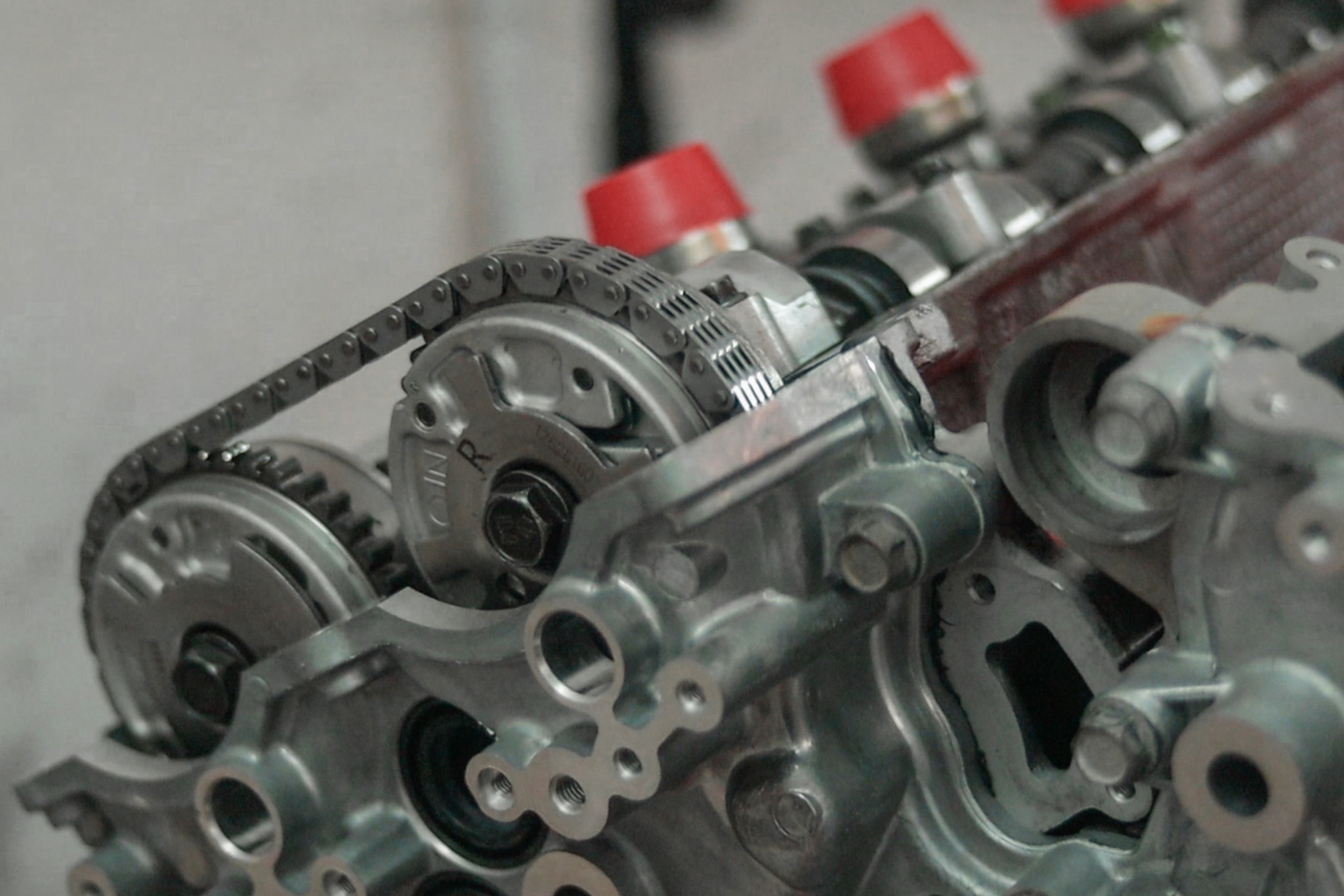
New Engine
New engines are also called crate engines. Available at the dealer, these expensive engines sometimes cost more than the vehicle itself.
Though the price may be prohibitive, a reason you would buy a new engine is its availabity, versus a remanufactured engine. For example, the engine for a high performance car or an older, collectible vehicle may only be available new.
A disadvantage is its untested nature. New engines’ blocks haven’t been through the process of heating and reheating, and settling, like the remanufactured engines have.
New engines range in price from $4000 for a low-end 4-cylinder engine, to well over $100,000 for a rare, hand built, or high performance engine.
This option is the most expensive, and it’s unnecessary outside of the special exceptions we listed.
Remanufactured Engines
Remanufactured engines are also called rebuilt, remaned, or reconditioned engines. These used engines have been restored to factory specifications. Most of their working parts have been replaced. For all intents and purposes, these are like-new engines with no mileage. These cost less than a brand new engine, but have the same quality of parts.
Remanufactured engines also have the advantage of having a seasoned engine block.
Seasoned engine blocks have been used for a few years, and have stood the test of repeated heat cycling. This causes the block to settle, and makes a stronger block than a freshly cast one. The block is more “relaxed’ than a new one that has yet to go through this process.
These engines are tested for reliability and durability. They range in price from $2500-$4000.
For our money, the remanufactured engine is the best value.
Cost of Mechanic Labor for an Engine Swap
Our mechanic quoted us $7500 for an engine replacement. That was $2500 for the engine, and $5000 for labor costs. The engine had 120,000 miles on it. To spend thousands of dollars on mechanic fees for an engine that was already halfway gone did not seem worth it.
What you can expect to pay per hour for the mechanic depends on their experience and confidence.
The lowest rate we found is $70/hr; the higher estimates are $90-$200/hr. So the cost to replace your engine in the shop would vary widely from $1050, if the mechanic charged $70/hr and only took 15 hours to complete the swap, to $4000, if the mechanic charged $200/hr and took 20 hours to finish.
Here are our calculations for the pricing estimates according to the time of the job and how much you might pay per hour:
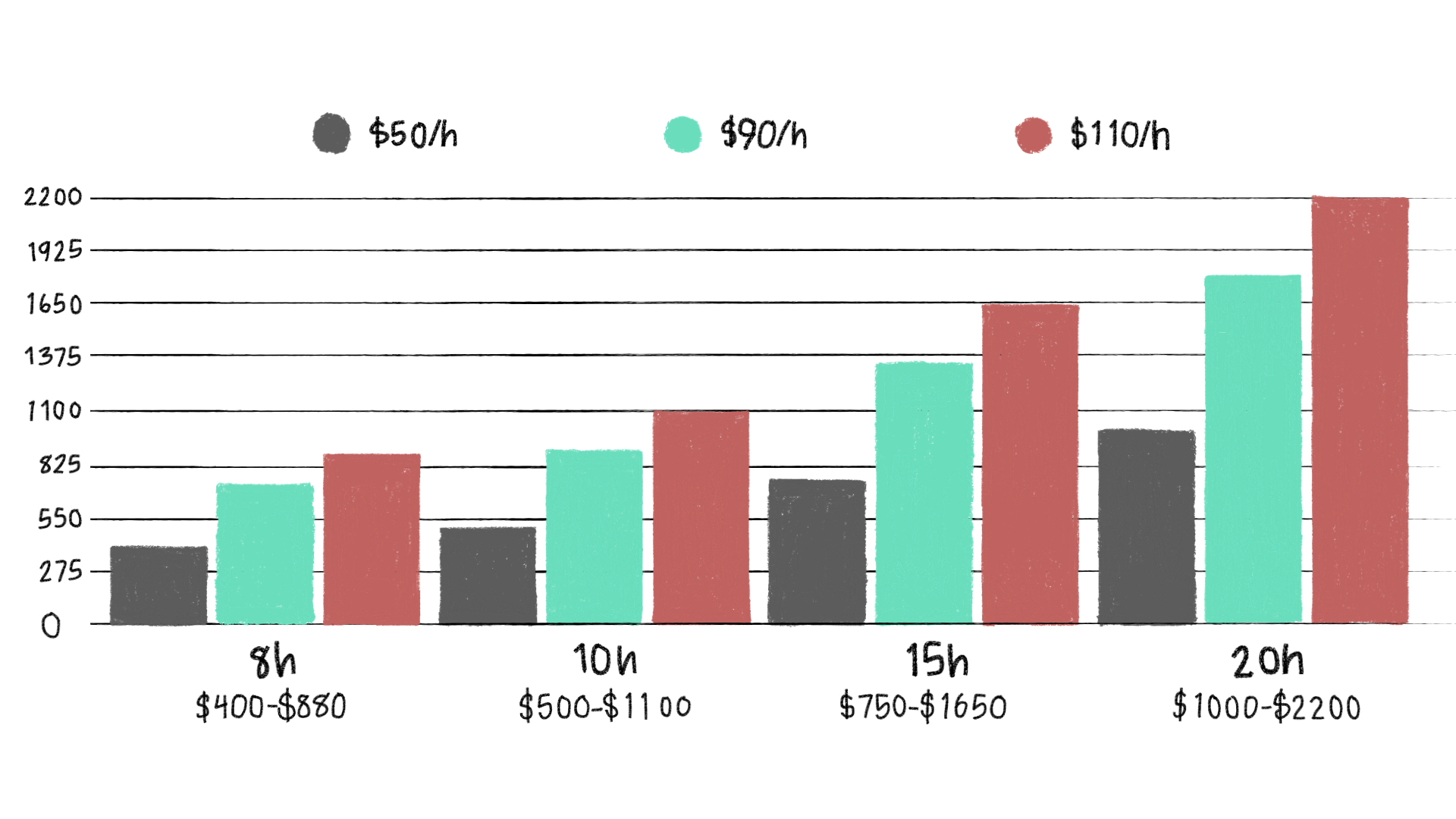
Labor costs can run from $70/hr-$110/hr, and these are estimates for the labor based on the the average quotes hours to complete an engine swap run from 8-20. (Gray is $70/hr, teal is $90/hr, red is $110/hr)
Cost of Replacing an Engine Yourself
When you do it yourself, you immediately eliminate the per hour costs of an engine swap, but you will need to spend some money on tools, depending on what you have to start with. It would be hard to say exactly what you need to spend on basic auto repair tools, because you probably already have many of the tools you need.
Cost of Tools
We’ve categorized the tools into two groups: Essential tools, and non-essential, but nice to have tools. You will spend $266.12 for the essential tools, and $1405 for the nice to have tools. Find the complete list here.
Is There Actually Money Saved?
So, do you actually save money replacing an engine yourself? You’d spend $2500-$7000 for an engine, and $266-$1405 in tools, + $159 for our video, you’d be out $2766-$7405 if you’re replacing your engine yourself.
If you go with a mechanic, you’ll spend $1050-$2750 in labor+ $2500-$7000 on an engine, for a total of $3550-$9750.
The chart below illustrates this better.
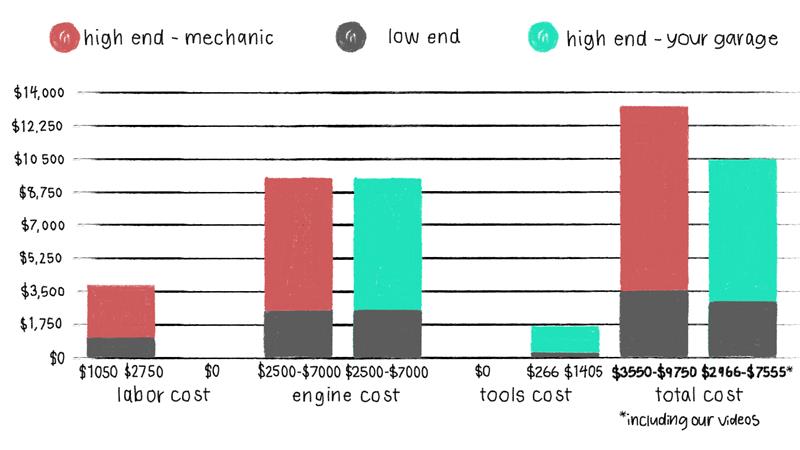
This chart breaks down the costs involved in an engine swap. The red bars represent the auto shop, and the green bars represent your garage.
So yes, you do save money on swapping an engine yourself.
If you can change your oil, you can learn to swap your engine. Buy our video.
3 Things You Need, and 3 You Don’t for a Home Engine Replacement
If you’ve decided to do an engine replacement, you’ve come to the right place! But where to begin? Knowing what you need vs what you don’t need is a good place to start.
Though often done by professionals, engine swaps are fixtures in the DIY community. In that spirit, here are three areas to consider before swapping your engine: The engine, equipment, and skills.
1: The Engine
What You Need
The first thing you need for your engine replacement is the engine. More specifically, you need to know where you can find one. There are several places online and in person where you can find one, but we’ve found that car-part.com does the job well. On this website, you can search for the type of engine you’re looking for, and it will direct you to an auto parts dealer in your area that can sell it to you. We found our engine on car-part.com and were able to get it at a reasonable price from a local parts dealer in our area.
What You Don’t Need
An engine hoist or crane: Most vehicle garages find engine hoists invaluable. They come in electric, hydraulic, and chain options. These expensive beasts are huge, with lifting capaciities of ½ to 8 tons. It would be difficult to fit both one of these behemoths and your car in a tiny garage. Not to mention the security factor: who wants to risk a giant car falling on their head?
Some cars are manufactured to remove the engine from underneath the body. This clever design removes the need for an engine crane.
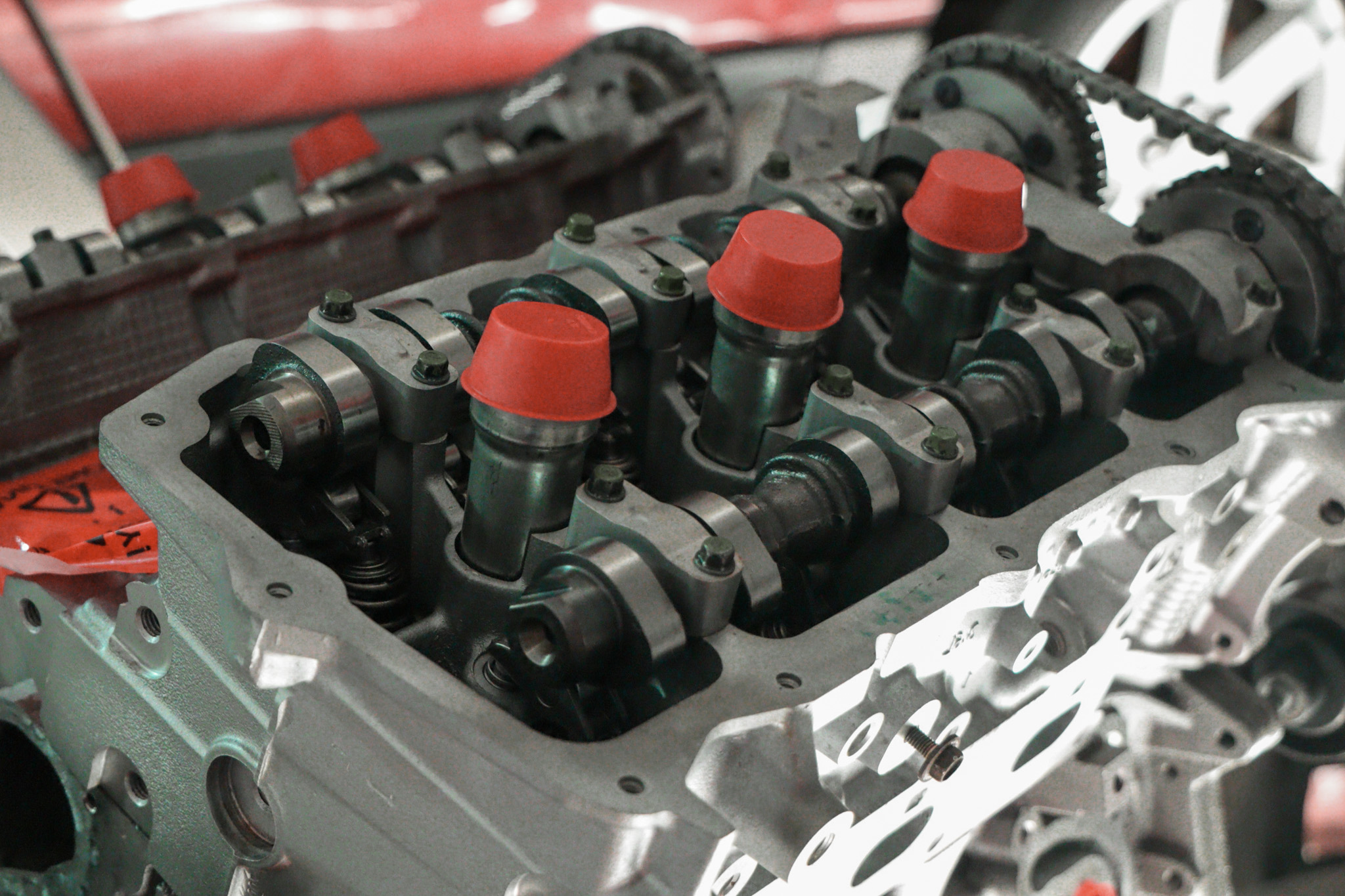
2: The Equipment
What You Need
As far as tools go, you may already have most of the tools you need. Along with traditional tools, like ratchets, wrenches and pry bars, you’ll need a few bigger tools. The ones we used are an engine lift, an engine stand, and a lift table, which you can find at your local Harbor Freight. Having a service manual for your car is also a great help. We completed our engine swap using a genuine service manual—and also recorded the whole process for you to follow along.
What You Don’t Need
A commercial garage: You don’t need a mechanic’s garage to complete an engine swap. Just like you don’t need an engine hoist, you don’t need all the space of an auto shop. A tiny garage is all you need. You don’t need the noise, the traffic, or the distractions of a shop. Nor do you need the unsolicited advice of everyone in the building.
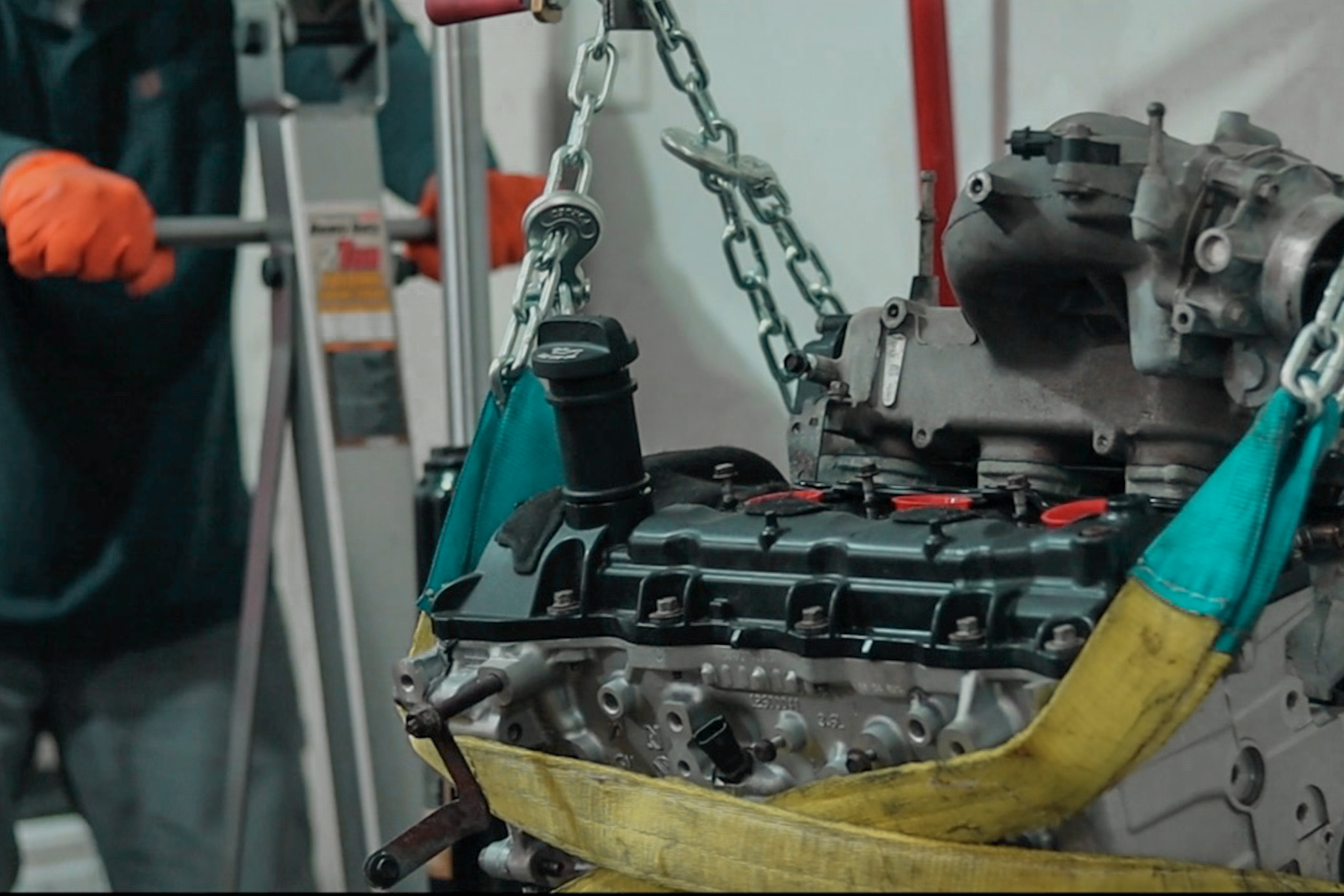
3: Skills/Experience
What You Need
Of course, there are skills you need to know before you can start your engine replacement. But, in fact, this job isn’t as daunting as it may seem. If you know how to change your oil, you’re already on the right path. Changing your own oil is a great stepping stone to the bigger job. It‘s more involved than checking your fluid levels and keeping air in your tires, but not an overwhelming task. If you can take care of the oil changes in your car, you can learn how to tackle a more difficult repair—swapping your engine.
What You Don’t Need
A mechanic can bring peace of mind. He’s an expert, after all. But you don’t need one to complete your engine swap. A mechanic charges labor by the hour. Your engine replacement is already susceptible to cost overruns without the cost of labor thrown in. And, despite his expertise, a mechanic won’t fix any extra problems without your telling him to and authorizing the added price. This is a tough job, but not overwhelming. If you can change your oil, you can learn to swap your engine. We can help.

You Can Replace That Engine
Now that you have a better idea of what you need for your engine replacement, you are ready to start. The confidence that comes from preparation can’t be faked. Now that you’re ready to swap your engine, you can plunge in with this introduction.
Get Your Copy of the Engine Replacement Course!
Step by step instructions and high-definition videos walk you through the whole process of the engine removal and replacement. The entire comprehensive engine replacement course is available for order right now!
Signup For Updates and a FREE Gift
Signup for the Email List and get The Perfect Engine Swap Tools List, a complete list of the tools you’ll need to do an engine swap in your own garage. The List includes source links and current prices so you don't have to search around for the right tools.


